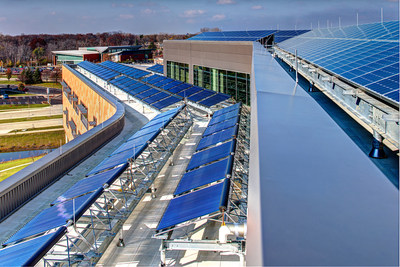Lightning Safety Alliance in support of Architecture Month
HARTFORD, Conn., April 16, 2019 — (PRNewswire) — According to the American Institute of Architects, sustainability is a key element of the architecture profession's approach to design in the 21st century. As architects are tackling a myriad of global challenges, including challenges posed by increasingly unstable weather patterns, more architects and planners are taking a "build" and "protect" approach to design and construction.

Since lightning is a weather hazard that affects people, property and places in nearly every region of the U.S., it's no surprise that lightning protection systems (LPS) have become increasingly important for the building process.
"Lightning protection is a built-in feature designed to protect structures—both old and new—from a very common, yet highly destructive weather event," said Bud VanSickle, executive director of the Lightning Protection Institute (LPI). "In an era where technology, delivery methods and construction science are evolving at a lightning-fast pace, specifying lightning protection is part of a best-practice risk management approach."
"Building design can have a profound impact on the economy, so it's important that architects and designers embrace a broader concept of sustainability," said Michael Chusid, RA FCSI, an architect specializing in building materials. "By including lightning protection systems in their owner check-lists, architects can deliver a higher level of quality assurance and value-engineering for resilience."
Architects who haven't considered lightning protection, may want to consider these five important reasons for including LPS in building designs and plans.
- Affordability - Pricing for LPS typically runs less than 1% the value of a structure; hence often less expensive than security systems, generators and specialty lighting.
- Safety Requirements – Insurance, OSHA and risk management authorities are increasingly citing lightning protection measures in their hazard mitigation plans.
- Fortifies Technology – Automated building systems and smart structures rely on lightning protection to prevent surge interruptions and costly downtime.
- Improves Sustainability – LPS is frequently included on Green and LEED structures as a building resilience measure against a common and highly destructive weather threat.
- Hazard Analysis: Lightning protection is increasingly required when a NFPA 780 Risk Assessment determines a structure's vulnerability to lightning is greater than its tolerable risk.
"Conducting a lightning risk assessment is the architectural standard of care," explained Chusid. "Architects who fail to use the NFPA procedure may be professionally liable if lightning damages a building they designed," he warned.
The Lightning Protection Institute and the Lightning Safety Alliance are honoring Architecture Month by providing architects with free educational resources about lightning protection and national safety standard requirements for LPS.
Build and Protect Resources for Architects
Related video:
The Importance of Lightning Protection for Architects and Engineers
Continuing education:
Lightning Protection 101 (LSA101) AIA/CES Registered Program
Build & Protect newsletter:
Winter 2019 Edition
LPS materials for A&E's:
Build & Protect portal
LPS inspection and certification:
LPI-IP Program
Rolling sphere animation:
YouTube
About the Lightning Protection Institute
The Lightning Protection Institute (LPI) is a not-for-profit, nationwide group founded in 1955 to promote lightning safety, awareness and education and is a leading resource for lightning protection information and system requirements. Visit the LPI website at
www.lightning.org for more information.
About the Lightning Safety Alliance
The Lightning Safety Alliance (LSA) is a non-profit, national league of lightning protection professionals and consumers dedicated to the promotion of lightning protection and lightning safety. Visit the LSA website at
www.lightningsafetyalliance.com for more information.
![]() View original content to download multimedia:
http://www.prnewswire.com/news-releases/lightning-protection-systems-and-sustainable-design-5-reasons-for-architects-to-design-with-lightning-in-mind-300832815.html
View original content to download multimedia:
http://www.prnewswire.com/news-releases/lightning-protection-systems-and-sustainable-design-5-reasons-for-architects-to-design-with-lightning-in-mind-300832815.html
SOURCE Lightning Safety Alliance
| Contact: |
| Company Name: Lightning Safety Alliance
Kimberly Loehr Email Contact 804-314-8955 Web: http://www.lightningsafetyalliance.com |









